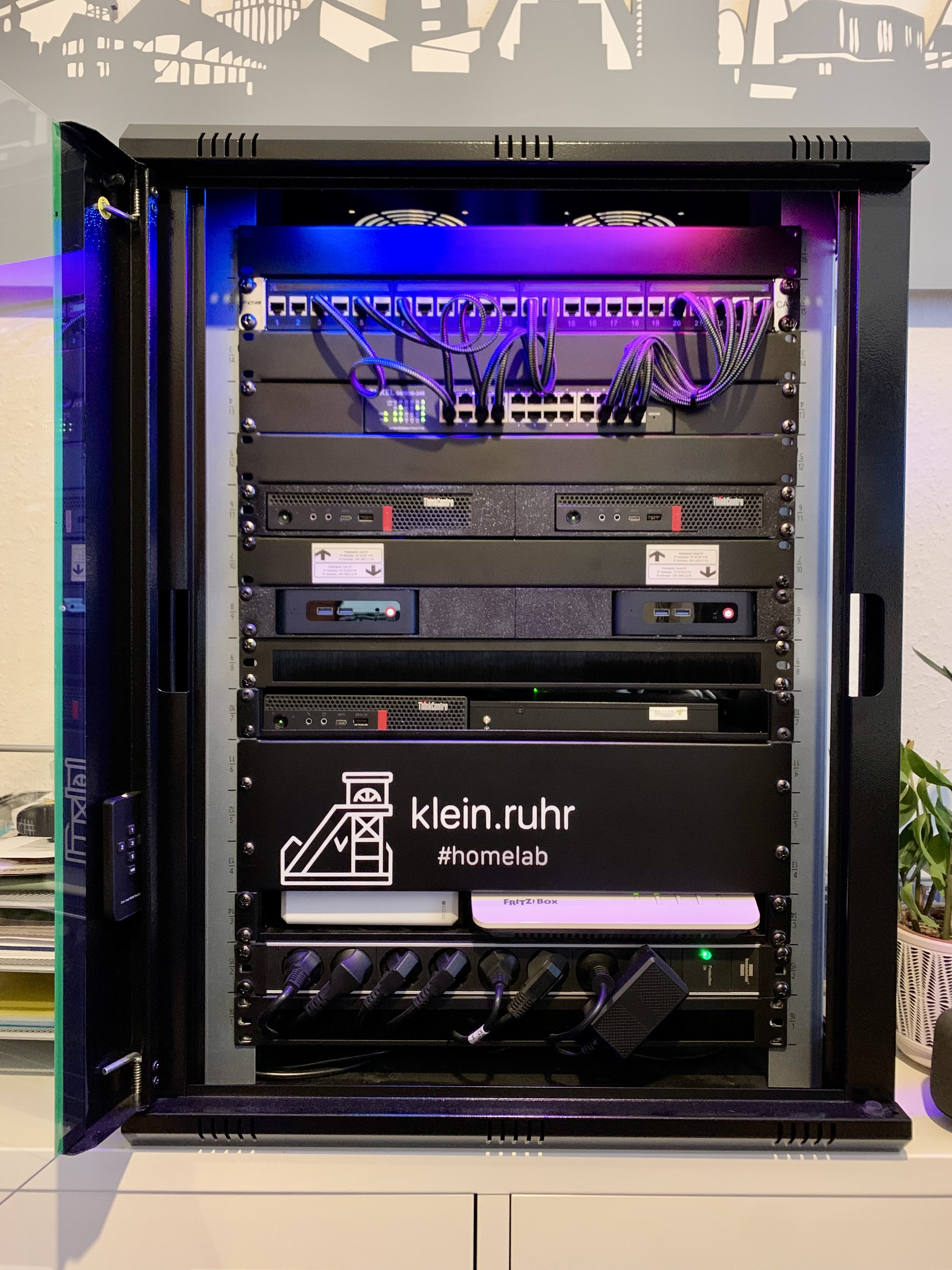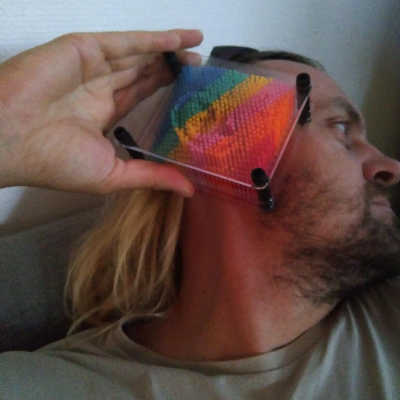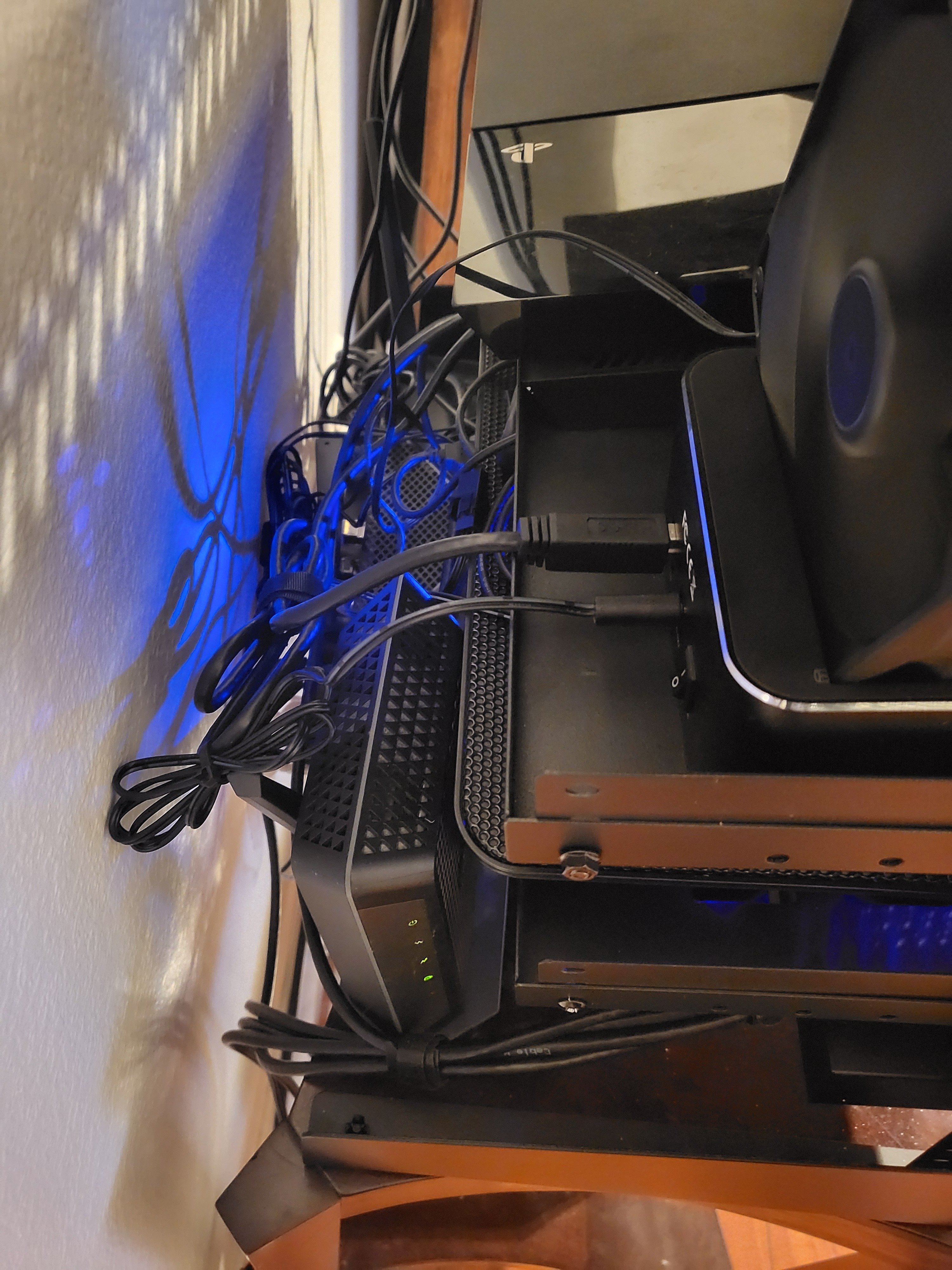
Only use jellyfin. Have a list of things want to update… but it works for now.
Yes that is a laptop usb cooler used as supplemental placebo cooling. Also a pc fan I have propped up against the hard drive feeding into the pi.
Can’t recall last time used the ps4 or switch. But they’re there
Seven Raspberry Pi 4’s and one Pi Zero, mounted on some tile “shelves” inside some IKEA furniture.

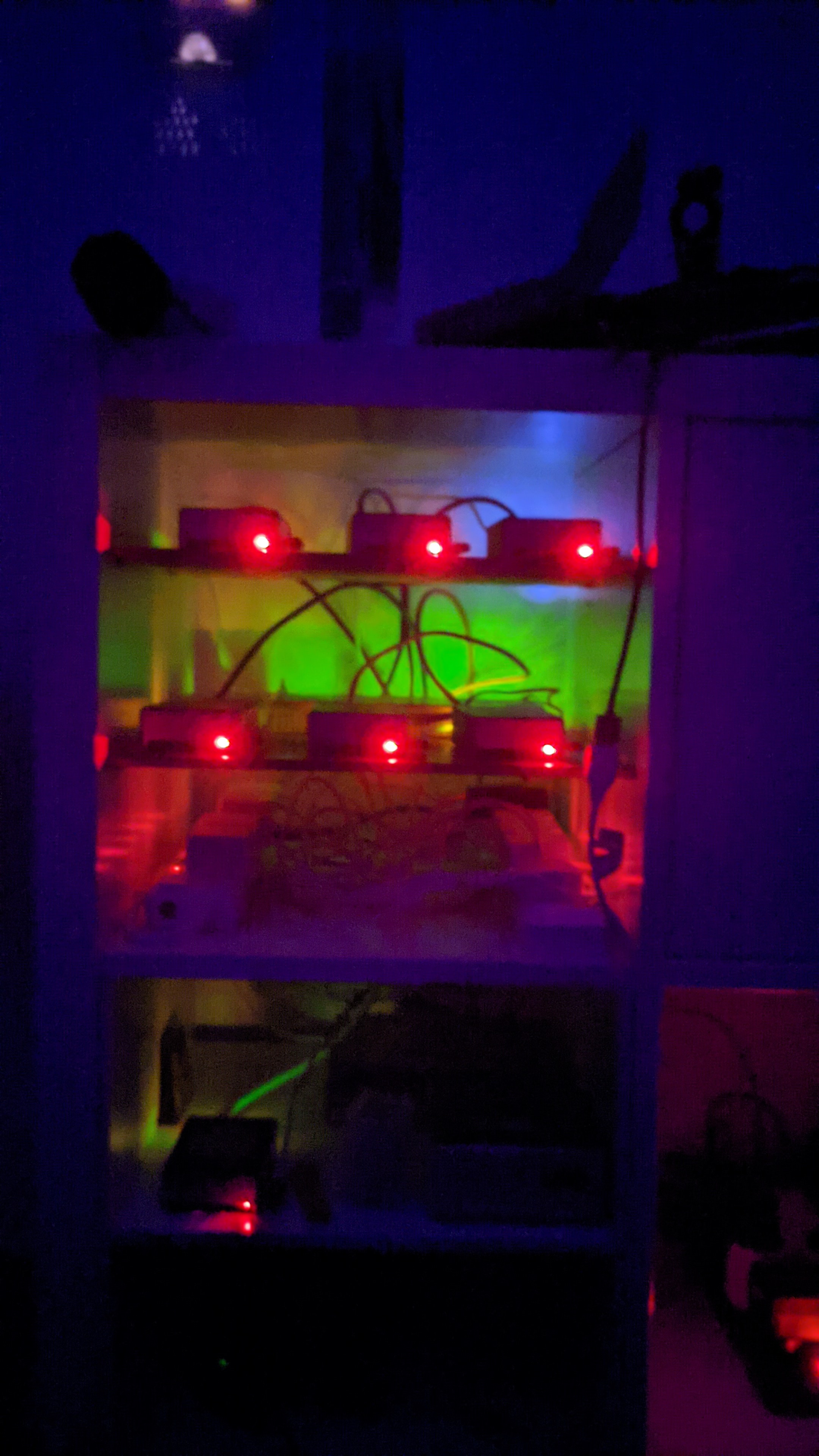
What do you do on that many pi’s that could not be done easier on 1 x86 box?
They’re fanless and low-power, which was the primary draw to going this route. I run a Kubernetes cluster on them, including a few personal websites (Nginx+Python+Django), PostgreSQL, Sonarr, Calibre, SSH (occasionally) and every once in a while, an OpenArena server :-)
I did a 4 node Pi4 kubernetes cluster for about 5 years. The learning experience was priceless. I think most notable was learning to do proper multiarch container builds to support arm and x86_64. That being said, about half a year ago I decided to try condensing it all into two n100 nuc-like clones and keep one pi as the controller. For me and my apps and use cases there was no going back. Performance gains were substantial and in this regard I think I was hobbling myself after the educational aspect plateaued.
Actually, as a web guy, I find the ARM architecture to be more than sufficient. Most of the stuff I build is memory heavy and CPU light, so the Pi is great for this stuff.
Except the Pi doesn’t have much memory.
Each Pi 4 has 8GB of RAM. With six devices, that’s 48GB to play with. More than enough for my needs.

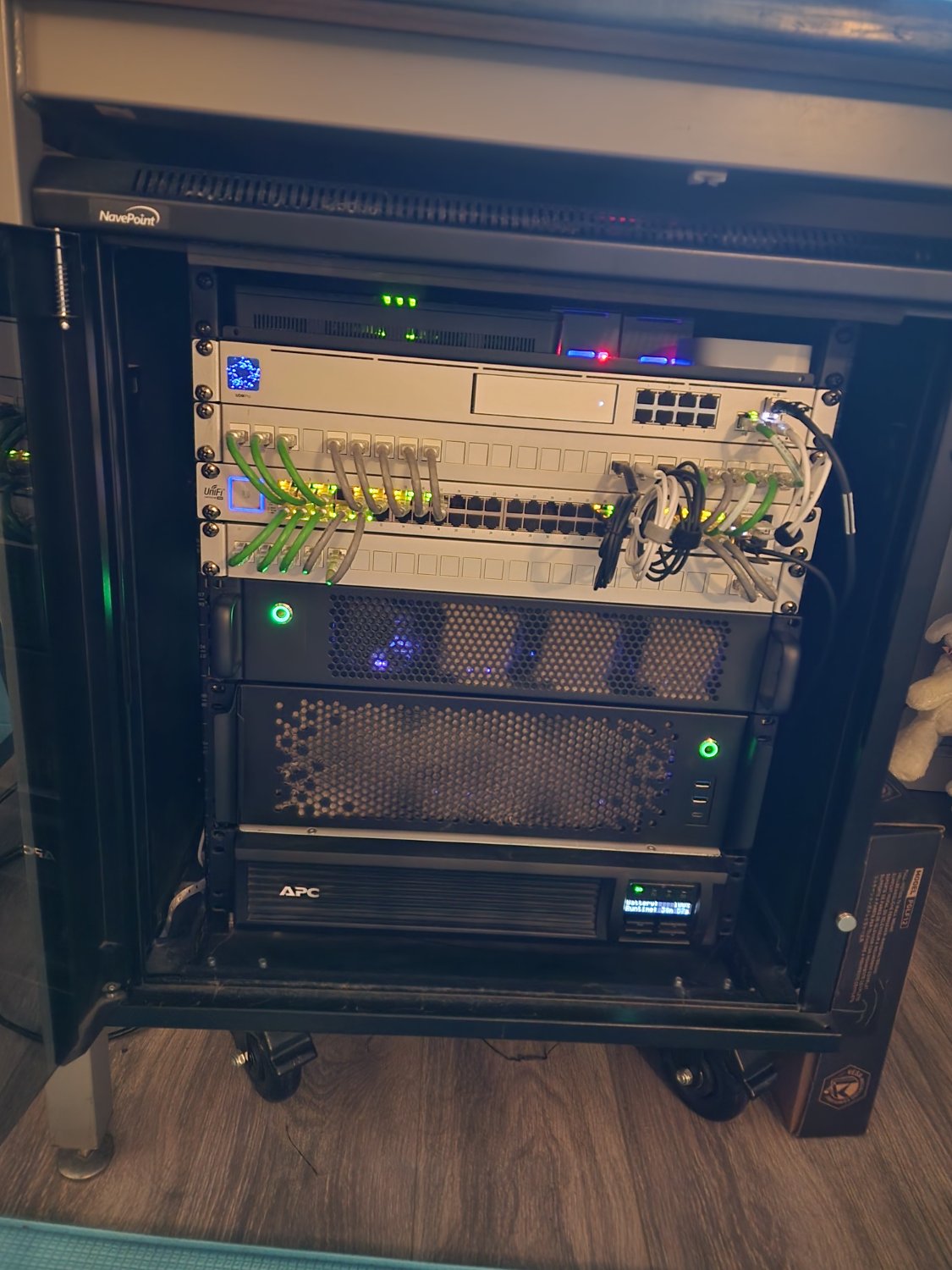
My 12u setup On top I have two pi’s; home assistant and pihole The ONT for fiber, hue bridge, and hdhomerun.
My dream machine pro
Patch panel
48 port switch i got from coworker
Patch panel
My unraid server
jbod
Battery UPSOk, now this is just showing off. Patch cables all the exact required length and everything all nice and neat. I bet you check your backups regularly and do a monthly DR fail over test too.
…Kidding aside, your setup looks really good.
Haha I need more Patch cables to get rid of those long ones. Also when I opened up the cabinet for this Pic I noticed the left fan isn’t dusty like the rest so it might be dead x_x
Could I interest you in some diagonal bracing today?
 An old HP laptop with Debian hosting Klipper and Home Assistant. Waiting for an OTG cable so I could replace the laptop with a phone for less power and heat
An old HP laptop with Debian hosting Klipper and Home Assistant. Waiting for an OTG cable so I could replace the laptop with a phone for less power and heatUsing phones with a continuous power supply might do nasty things to the battery.
Source: I finally figured out how to open a glass back phone with no tools.
Heat, then suction?
On a related note, I solved the battery issue with my wall mounted Fire tablet (for an HA dashboard) by connecting the power supply to a smart plug and setting up an automation to only give it the juice for about 3 hours per day, spread throughout the day
It still amazes me that the smartest phones aren’t yet smart enough to have direct power supply.
Like my 40 year old AM radio.
Because $$$ !
I’ve done similar with an old Android tablet. Installed Fully Kiosk Browser to display the dashboard AND read the battery level - above 75%, switch off power…
But… automations only trigger when going past the threshold once, so if there’s a random issue where HA doesn’t see the battery drop below 10%, (had that happen a few times in the past), then I also have multiple triggers for 5% and 2%… to turn the power back on again 😉
Yeah, the tablet runs Fully Kiosk and I tried the same thing with the battery percentage thing and ran into the same issue, so I just simplified and made the automation time-based.
The tablet also likes to freeze a few times a day, so I also created an automation that toggles the smart plug power whenever HA loses connection to the tablet for more than 5 seconds, then toggles back to the original state at the start of the automation, which corrects the problem. Until the next time. But hey! It was only $60, so it’s fine.
Ah, good call on using the power to get the tablet to respond… I don’t have that problem (tablet freezing), but it does drop off the wifi sometimes.
Wait I see EMT piping for that printer frame… Did you convert an Anet A8 to an “EMT-8” like I did!? :D
Just seemed like a neat coincidence!
The stock A8 was such a scary fire hazard lol.
Yup you’re indeed seeing an EMT8 :D. This thing’s got a SKR mini e3 V3, E3D v6 clone and an E3D titan clone. I have a post about it in my profile.
I bet there are dozens of us EMT8 owners! Dozens!
That’s so cool! Nice work! I feel a certain kinship with anyone who also got tons of 3D printing XP by building, rebuilding, researching, modding, head-scratching, laughing, crying, screaming at an A8 lol.
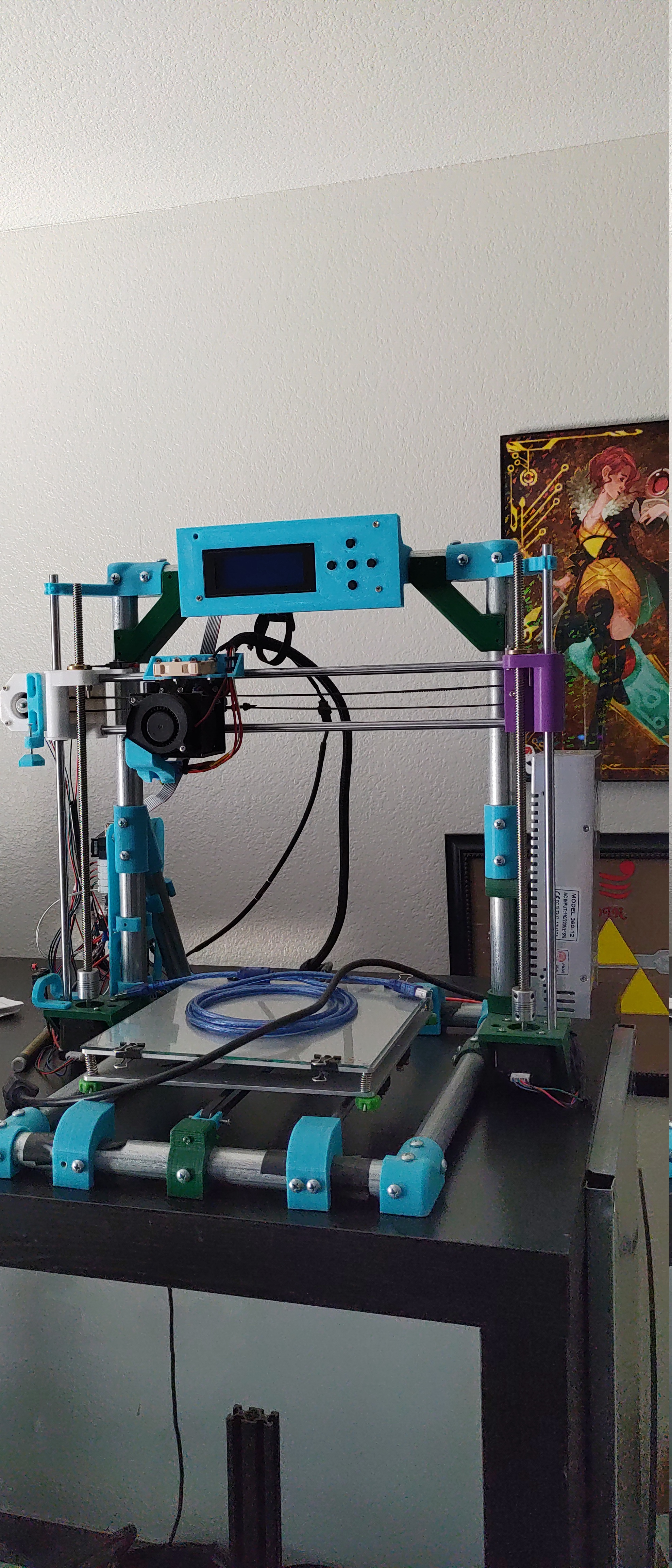
This here is mostly fire prevention: Basically an updated stock motherboard, better PSU, an aftermarket MOSFET board for safety, thicker gauge wires with ferrule crimps for all the power cables, the bed is now attached directly to the thicker wires by way of crimp connectors.
The printing surface is upgraded to carefully cut and polished picture frame float glass. 😂
Added that sweet fan duct mod, a little Noctua 15mm (because it softened and jammed otherwise LOL), and printed that purple bracket at the library because the plastic decided to literally crumble away.
Also the adjustable Z-stop was nice but the PLA softened so it’s a bit unpredictable, and the right motor will gently slip until it’s engaged so the gantry needs to be leveled every time…I also can’t guarantee that the Z rods are straight anymore because it requires such a Goldilocks level of tension I probably overdid it lol.
Oh yeah, I had to replace the main power cable because the one provided just…had a break in it.
It still works for small jobs though! And it printed all those parts for itself, so that’s kinda the RepRap dream right there right??
Lol I feel like an amazing machine is in here somewhere if I bothered to research custom boards and stuff. The stock bearings are also terrible. But if I can bother someday I’ll stick Klipper on it maybe.
It was a crazy, stressful journey…but I learned a ton of electronics stuff, and how to use a multimeter, and engineering stuff! XD
My Ender3V2’s felt like such a crazy luxury by comparison. 😂
Yeah I thought this thing was pretty decent, way better than originally, but then I got to use a Prusa MK4 at school…
was going through some old pictures and decided I’d post a retro setup. pretty sure I took this picture with my android g1…so 2008ish?
here is a pic of one of my first selfhost setups. I began selfhosting for music and have never stopped. this iteration was stuffed behind a bar that was built in to the basement at my old house
the old fashioned was custom built and was running some flavor of windows server. the one on the floor was the first Linux server I had run to do something useful…torrents and subsonic IIRC. I pieced that server together with random parts, mostly donated from old family PCs. two UPS units were on the bottom rack of that metro shelf to battery back the servers and the tomato router out of frame.
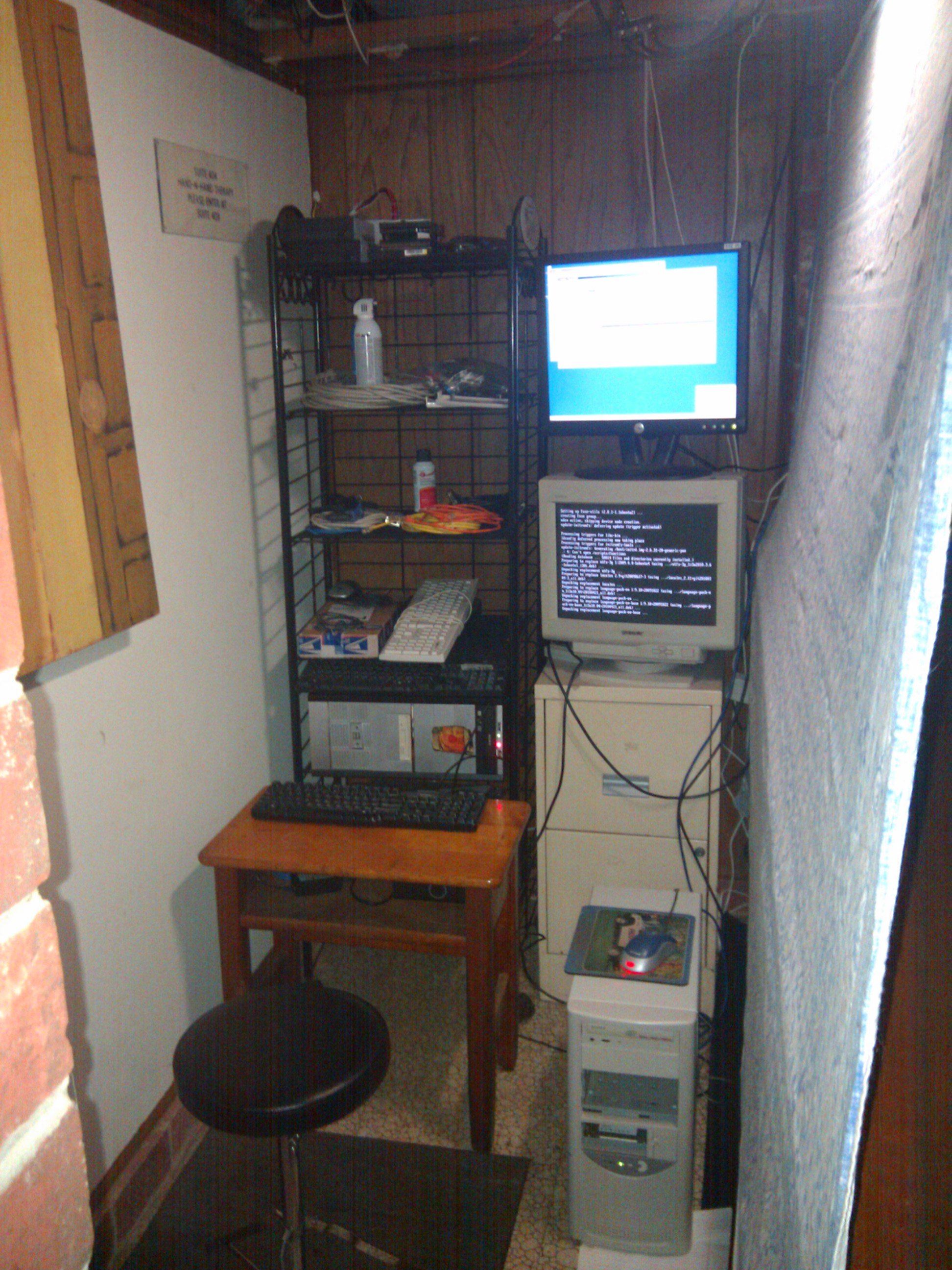
Man this picture is such a vibe lol. Love it. :D
Wait so you have like rack mounted server but only run jellyfin? Am I missing something here ?
I had the same thought - an entire 8U rack to hold a single raspberry pi with an external drive?
Come on guys, that’s a whole 8TB.
There’s no rules here
This table rack was the most space savey option i could find. It looks less stable than it is. It is super minimal as far as the actual self hosting stuff goes.
Room to expand eventually.
Its a rack mounted rack without the server.
Wait so you have like rack mounted server but only run jellyfin?
What would be wrong with that?
I considered it pretty heavy equipment for just a single service but that’s coming from my experience running like 8 vms on an old gaming pc and tearing my hair out over how janky it all looks (it works fantastically for me tho)
I guess it depends on your library size and how many users you are serving. My plex server has a library of over 110 TB and over 60 users, so to me a rack mount server for Jellyfin alone doesn’t sound overkill at all
Damn how does one amass 60 users? That’s a big ass family
About a third of it is friends of mine, the rest is family and extended family
That’s awesome!
Below, a picture of my small rack, which is located in my home office. Due to the selected components, it is virtually silent and still bobs along at only 26 - 28° C.
The hardware is divided into two Proxmox clusters. The first consists of the three Lenovo M920qs shown here and is home to my publicly accessible services and VMs, the second consists of the two Beelink EQ12s and is responsible for the internal services or those accessible via VPN.
Not the greatest or best Homelab, but for me, it fulfils all my needs and at the same time keeps the electricity costs down to an unimaginable level.
I host the following services on the public Internet:
- Ghost CMS
- Mastodon
- Pixelfed
- PeerTube
- Lemmy
- Rallly
- Nextcloud with Collabora Office
- Rustdesk
- Umami
- Uptime Kuma
- Vaultwarden
- Whoogle
- Minecraft Server (for my son)
Internally, I also provide the following services:
- AdGuard Home (redundant)
- FreshRSS
- Homepage (Dashboard)
- Jellyfin
- the Arr’s
- Linkwarden
- WireGuard
- Zoraxy
- ChangeDetection
- Forgejo
- MeTube/AnonymousOverflow/ProxiTok/RedLib/SafeTwitch/LibMedium
- Grafana/InfluxDB/Prometheus
- Homebox
- IT tools
- Mealie
- MiniQR
- Speedtest-Tracker
- Wallos
- Web-Check
Any chance on getting more info about the hardware specifics? From the sounds and looks of it this is almost exactly the scale of what I’d like and running pretty much the same things I’m thinking interested in.
You’re very welcome! I’ve provided a detailed overview of my entire setup on my blog, and following your request, I’ve updated it to reflect the latest changes.
You can check out the post here: https://blog.klein.ruhr/homelab/
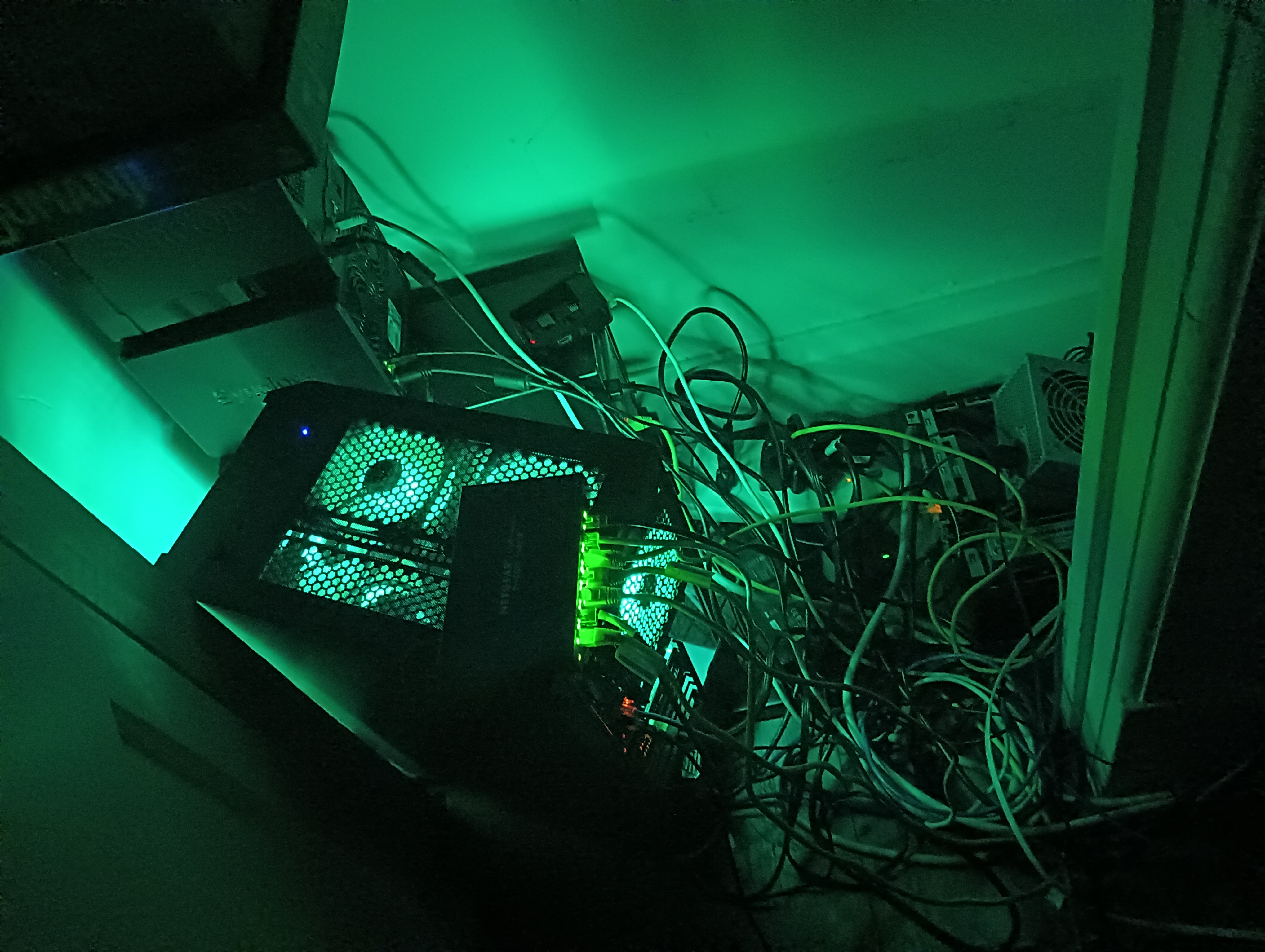
messy asf, a proper hobbiest system
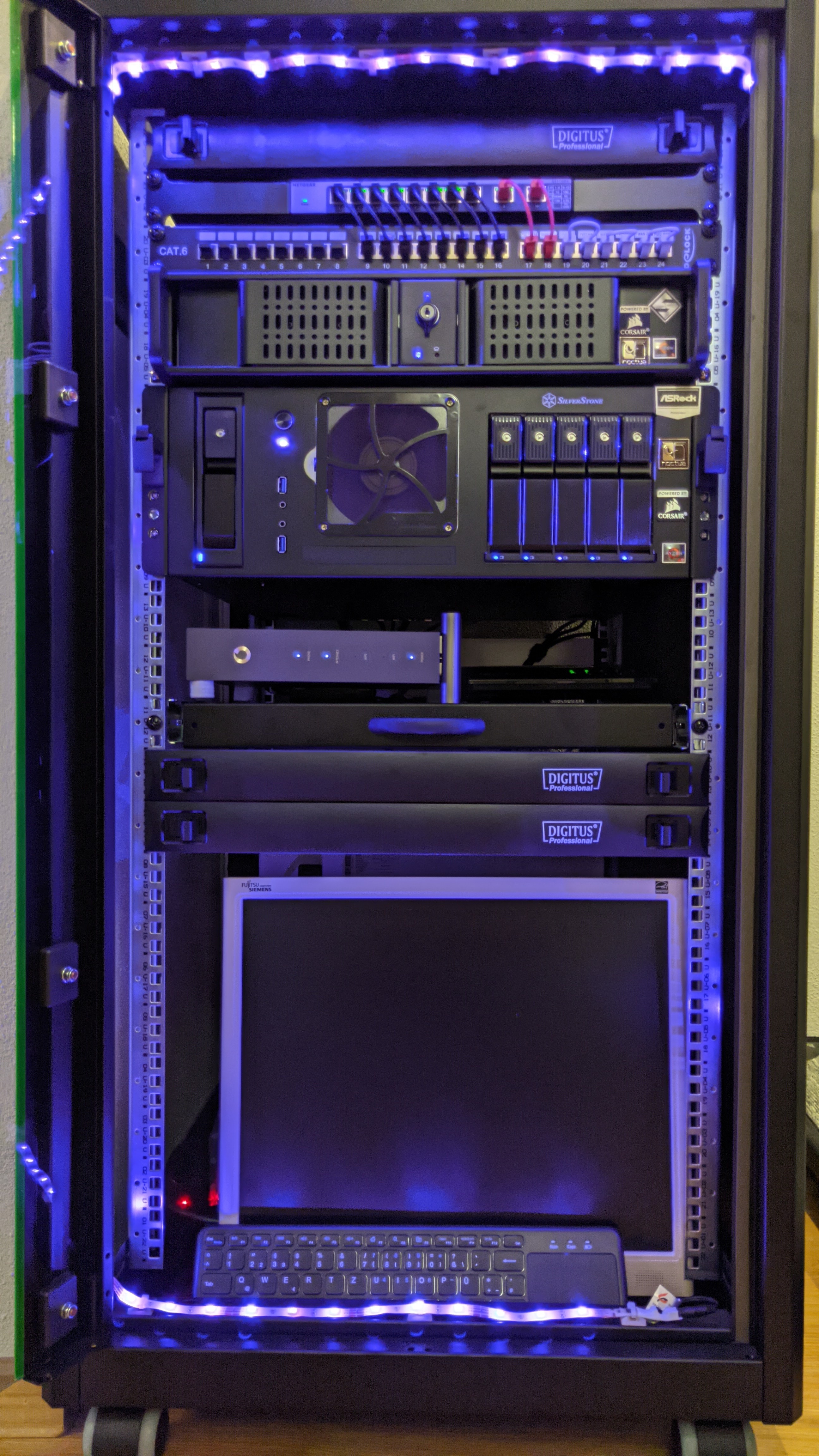
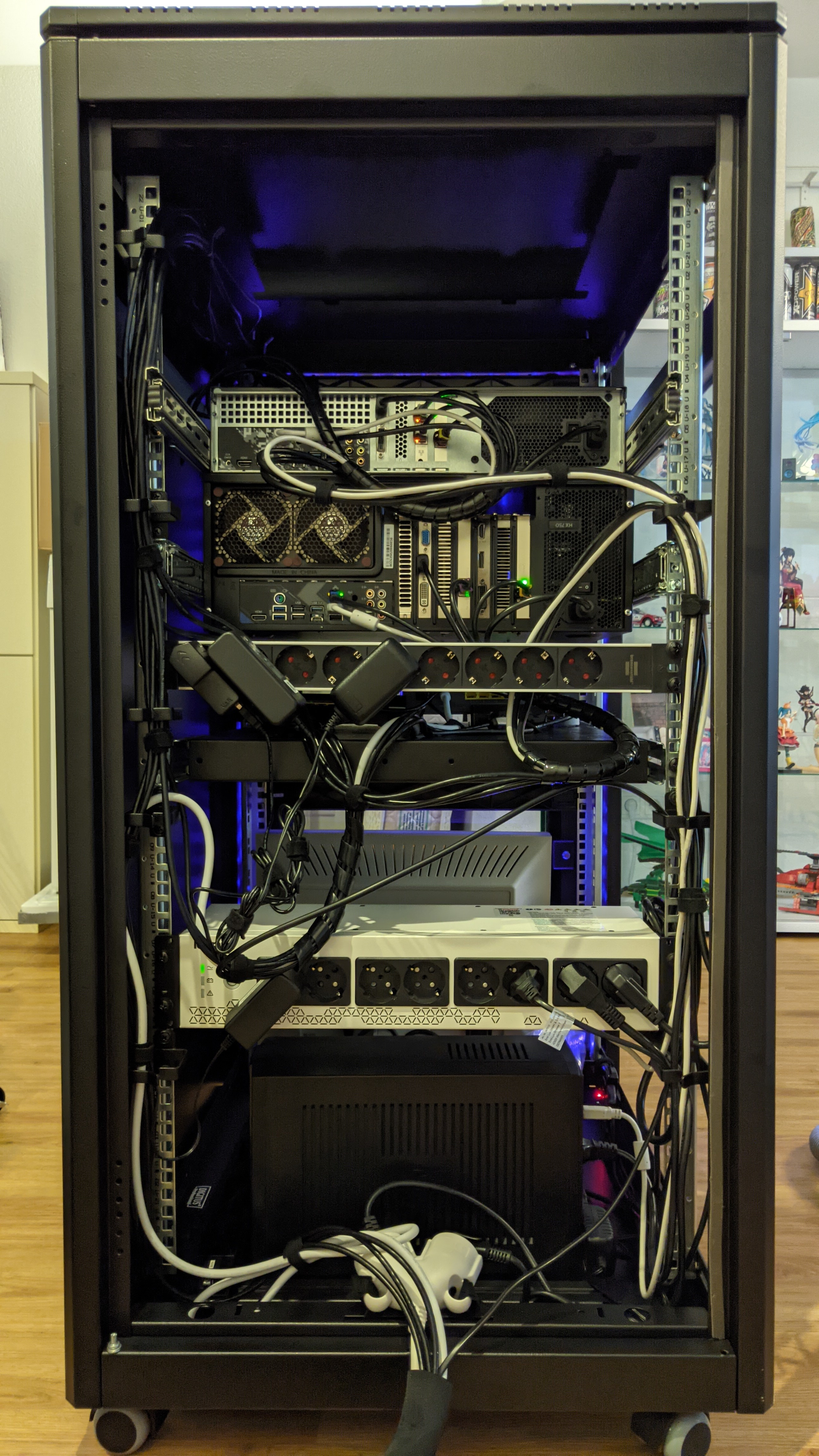
That’s a nice setup. I am weirdly jealous of the sliding shelf. The CS350B is very nice as well.
deleted by creator

So nobody is going to ask about the rotary phone?
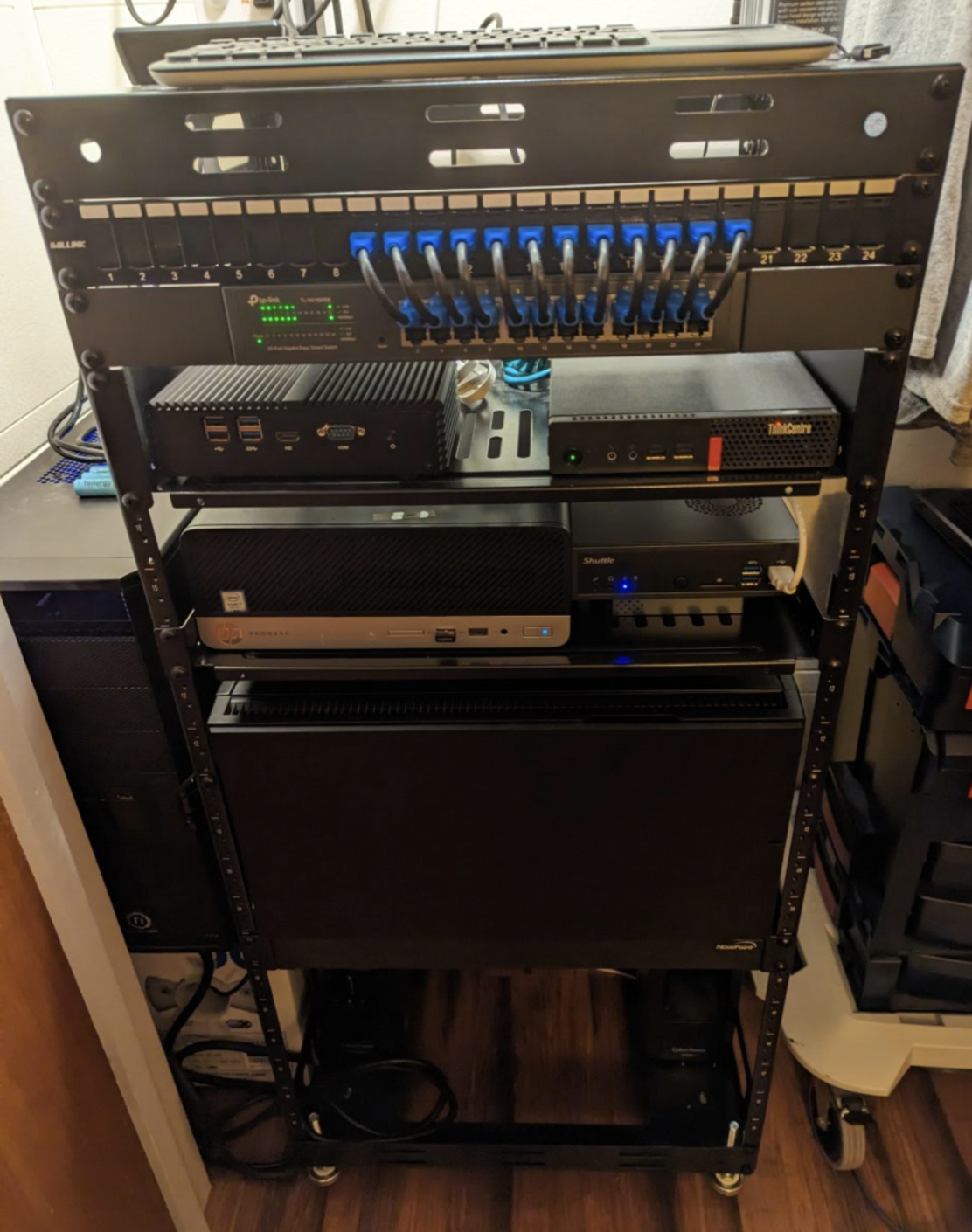 From top to bottom:
From top to bottom:- Patch panel (with artisinal, handmade cables)
- TP-Link managed switch Shelf 1:
- PFSense 4 port firewall
- Lenovo m910q w/Proxmox (cluster node 1) running 2 VMs for docker hosting: Ubuntu for media stuff (arrs, navidrome, jellyfin, calibre, calibre-web, tubesync, syncthing) and Debian for other stuff (paperless-ngx, vikunja, vscodium, redlib, x-pipe webtop, fasten health, linkwarden, alexandrite), 1 Win 10 VM for the very few times I need to use windows, some Red Hat Academy student and instructor RHEL 9 VMs, and an OPNsense VM for testing Shelf 2:
- HP Elitedesk G5 800 SFF w/Proxmox (cluster node 2) with an Nvidia GT 730 passed through to a Debian VM used primarily as a remote desktop via ThinLinc, but also runs a few docker containers (stirling pdf, willow application server, fileflows)
- Shuttle DH110 w/Proxmox (cluster node 3) with 1 VM running Home Assistant OS with an NVME Coral TPU passed through as well as a zooz 800 long range zwave coordinator (the zigbee coordinator is ethernet and in a different room) and two LXCs with grafana and prometheus courtesy of tteck (RIP) Shelf 3:
- WIP Fractal R5 server to replace the ancient Ubuntu file server to the left (outside the rack, sitting on the box of ethernet cable) that is primarily the home of my media drives (3 12 TB Ironwolf drives) and was my first homelab server. The new box will have a Tesla p4 and RX 580 GTX, i7-8700T and 64GB RAM in addition to the drives from the old server. I’ll be converting the Ubuntu drive from the old server into an image and will use it to create a Proxmox VM on the new server, with the same drives passed through. Bottom:
- 2 Cyberpower CP1000 UPS with upgraded LiFePO4 batteries. The one on the left is only for servers and only exists to give the servers time to shut down cleanly when the power goes out. The one on the right is only for network devices (firewall, switch and the Ruckus R500 out of shot mounted higher in the closet)
My tech stack:
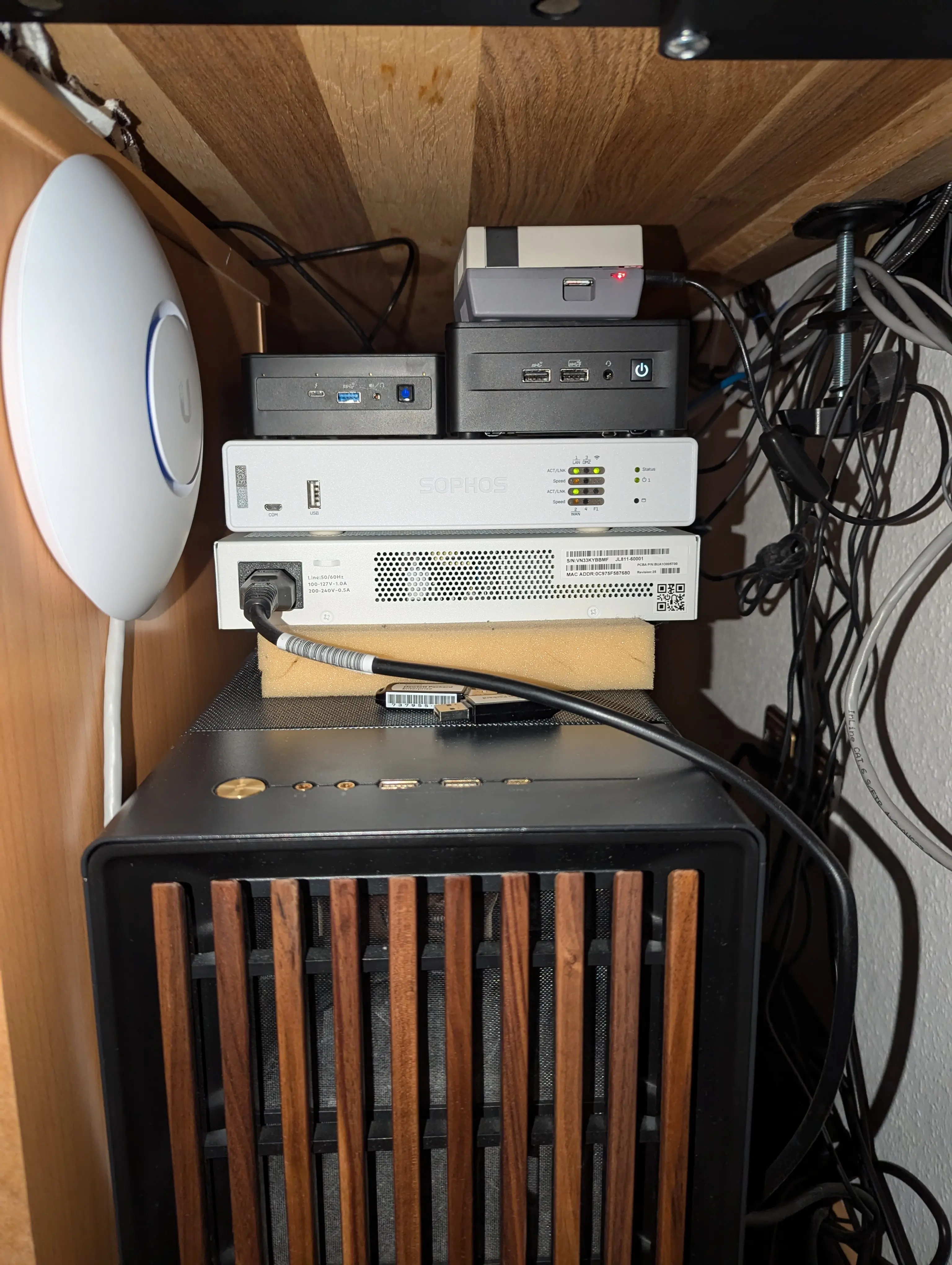
And my storage NAS:
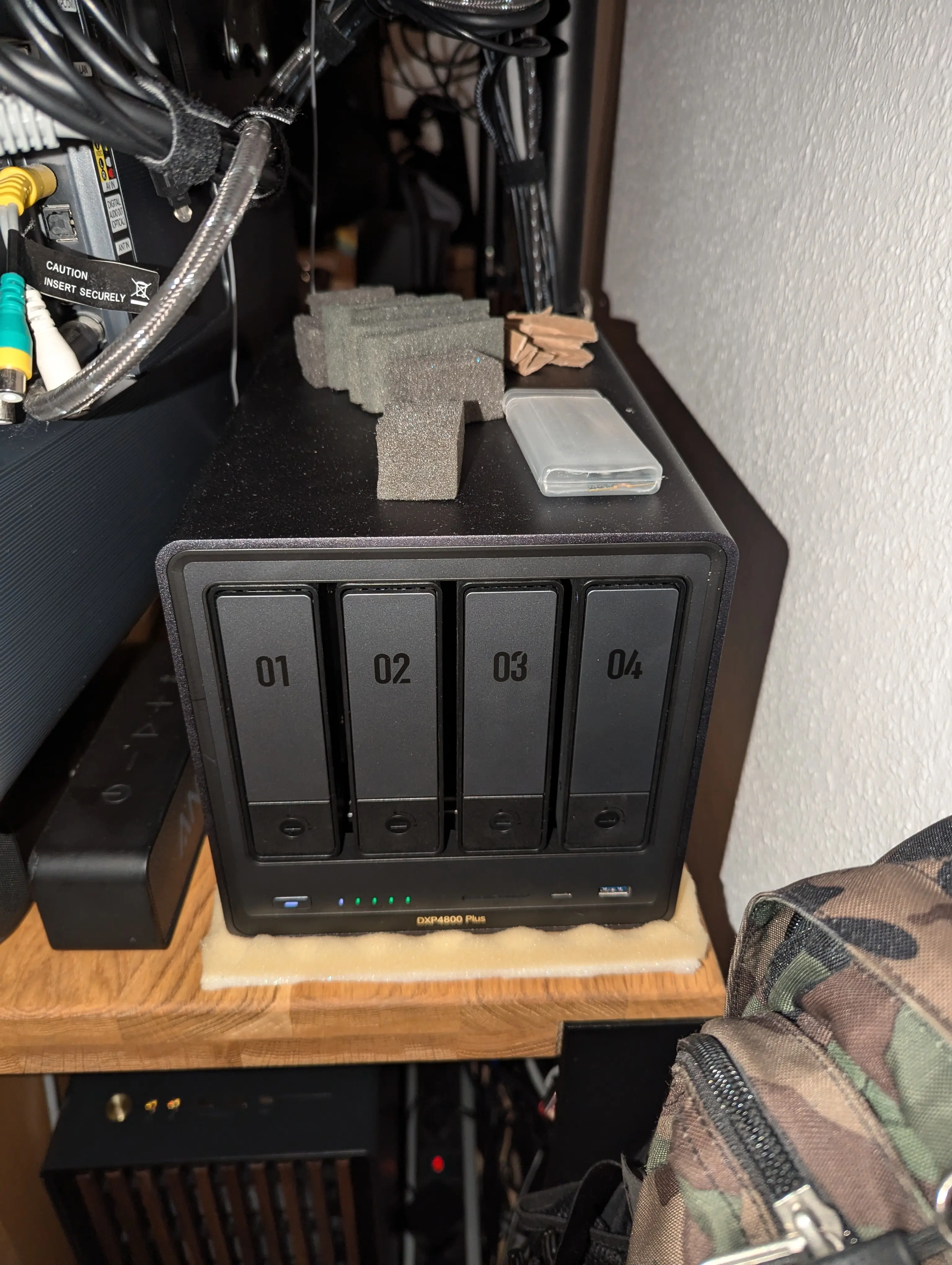
Bottom NUC: General compute
Top NUC: Proxmox with homeassistant, windows server and debian
Raspberry Pi4 inside N64 case: PiHole
Access Point: Unifi Pro
PC for gaming: R7 7800X3D + Nvidia 3070 inside Fractal North
NAS: Ugreen 4800+ with 4x 15TB drives for a total of RaidZ2 30TB usable storage. Used as NFS storage for proxmox.How it started: 2 8TB external HDDs connected to my bottom NUC.
Primary applications:
*arr Suite, Jellyfin, several minor apps.Why do you have the AP in there? Doesn’t that affect your Wi-Fi range?
Wood in both directions. Also I have no other place to mount it without looking ugly as hell.
Also I’m renting so no easy wall mounting.Ah, that makes sense. I have 7 nano HD in my house because constructions here are all concrete, so pretty much 1 AP per room.
The wall to the right is also solid but doesnt matter as I am not much in there.
But for concrete in all walls…Jeez must be expensive and annoying to run cable in all rooms.That’s an understatement, lol. And all my cabling is 6A, which is basically an iron bar 🤣. It took me and a friend of mine almost 4 days to push that wiring through
Had to pleasure of reorganizing a half depth networking closet with patchpanels and a half-depth 48-port switch.
Jesus Christ I needed all my strength (while standing on a 2 step ladder) to mash that switch in enough to screw the rack ears… Not pleasent in the slightest.
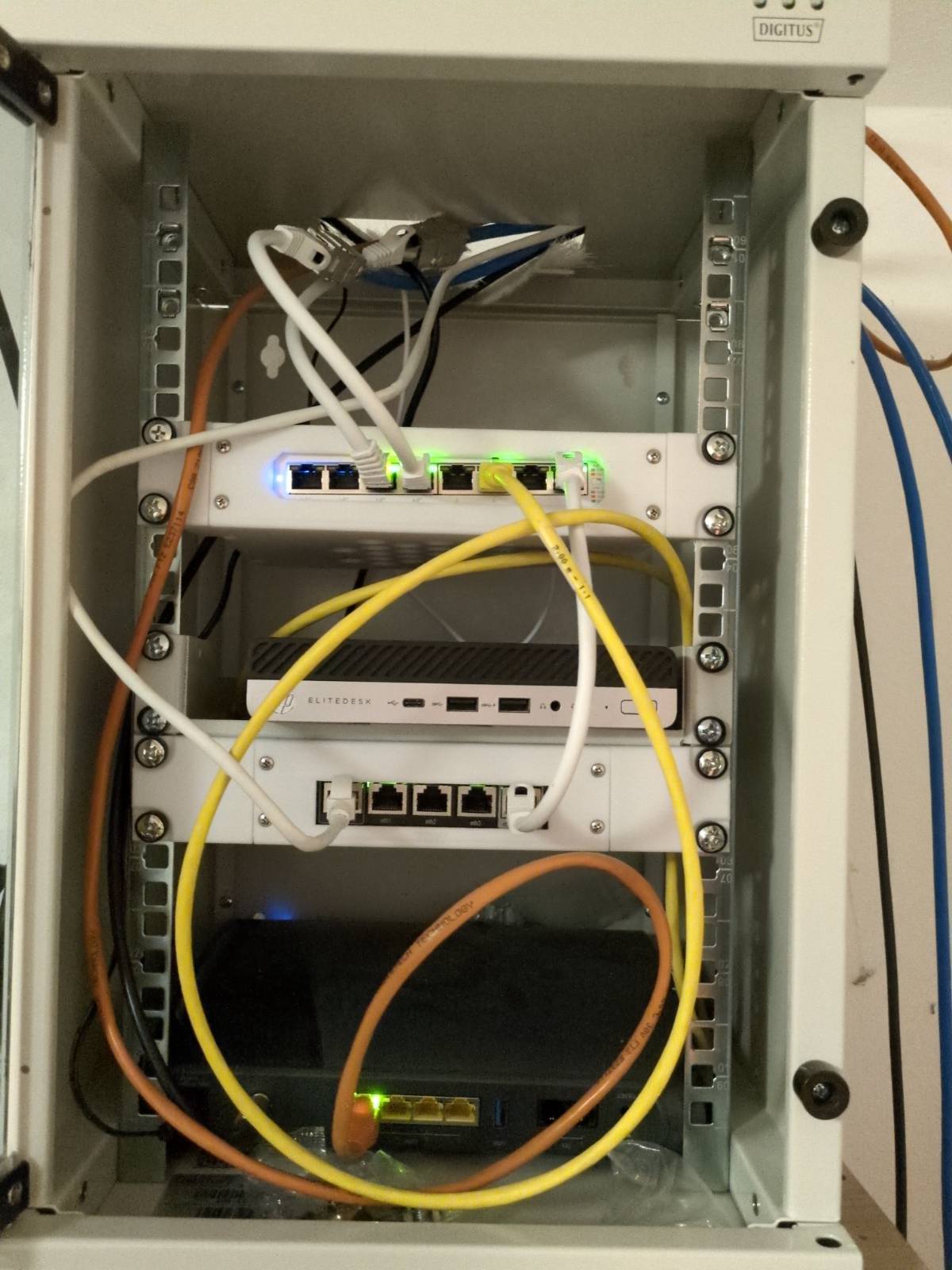
Small, 10 inch rack, with some 3D printed rack mounts.
This is great. I have couple of those HP machines which are awesome but was just stacking them on my desk. 10 inch rack will be great for them. Need to do some hunting.
My HP has a 65 watt CPU built in, when it’s running at full load it is quite loud.
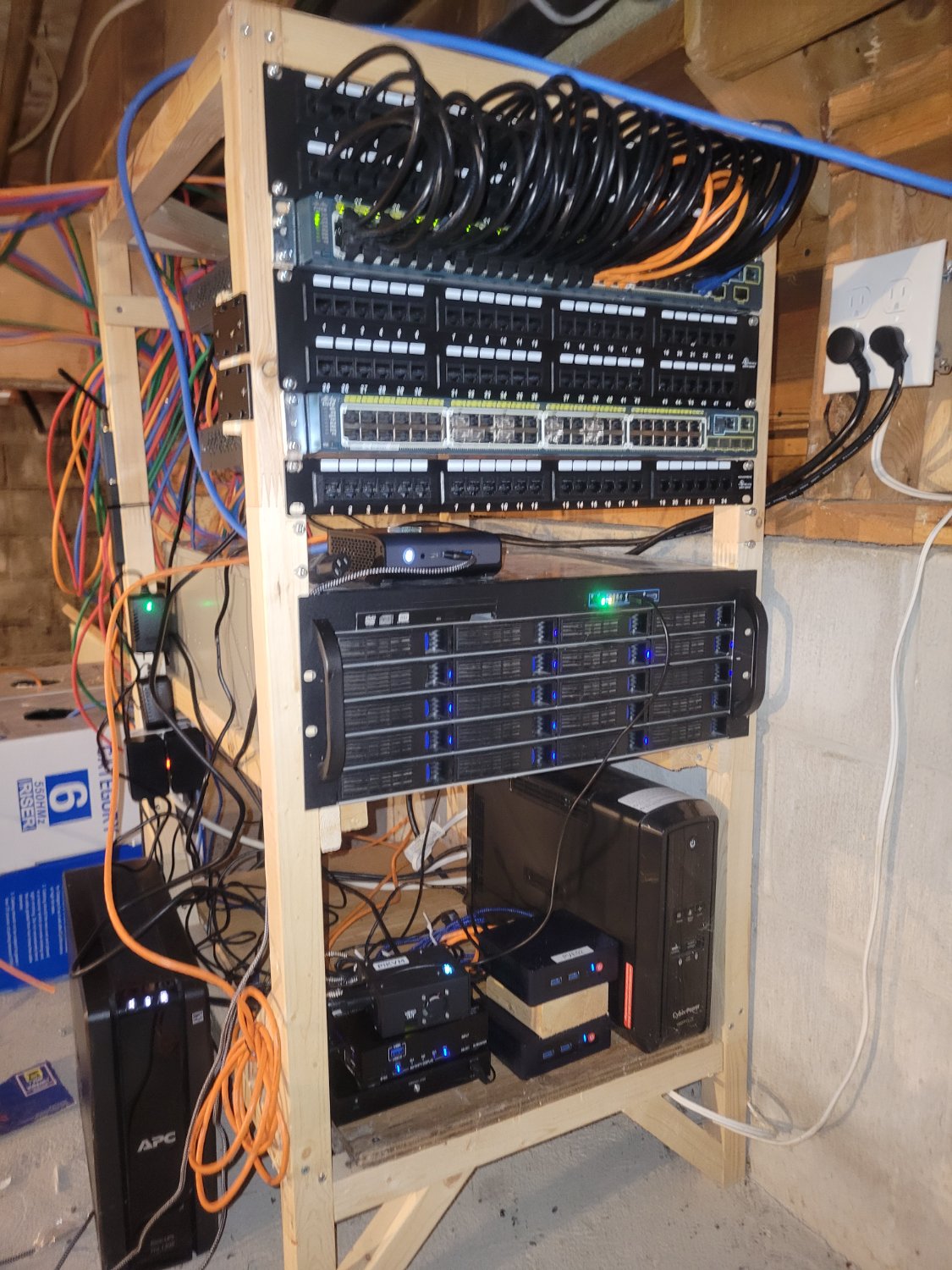
Top to Bottom:
- 48port Patch panel
- Cisco 2990 48 port Poe
- 48port Patch panel (future)
- Cisco 2990 48 port Poe (future)
- 24 port patch panel (spare)
- Pfsense 2.5gb eth minipc
- 4u server 20 bay (proxmox)
Bottom area:
- 2 mini pcs (proxmox)
- PiKVM and ezcoo switch connected to all PCs
- Couple of UPS
The access to the crawlspace isn’t great so the CrapRack tm had to be assembled in the crawlspace.
Hope you grounded your hardware to the wood.
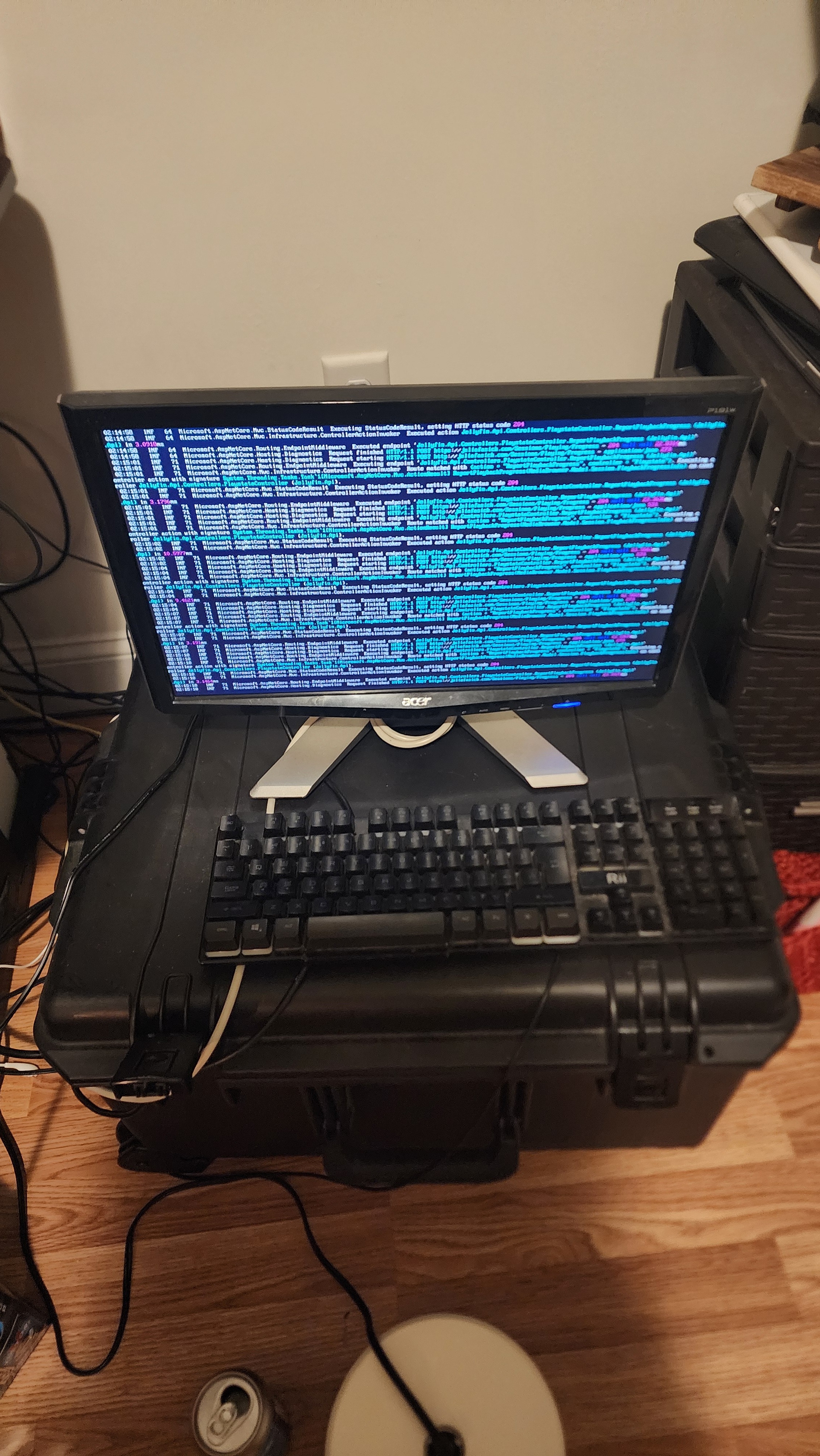
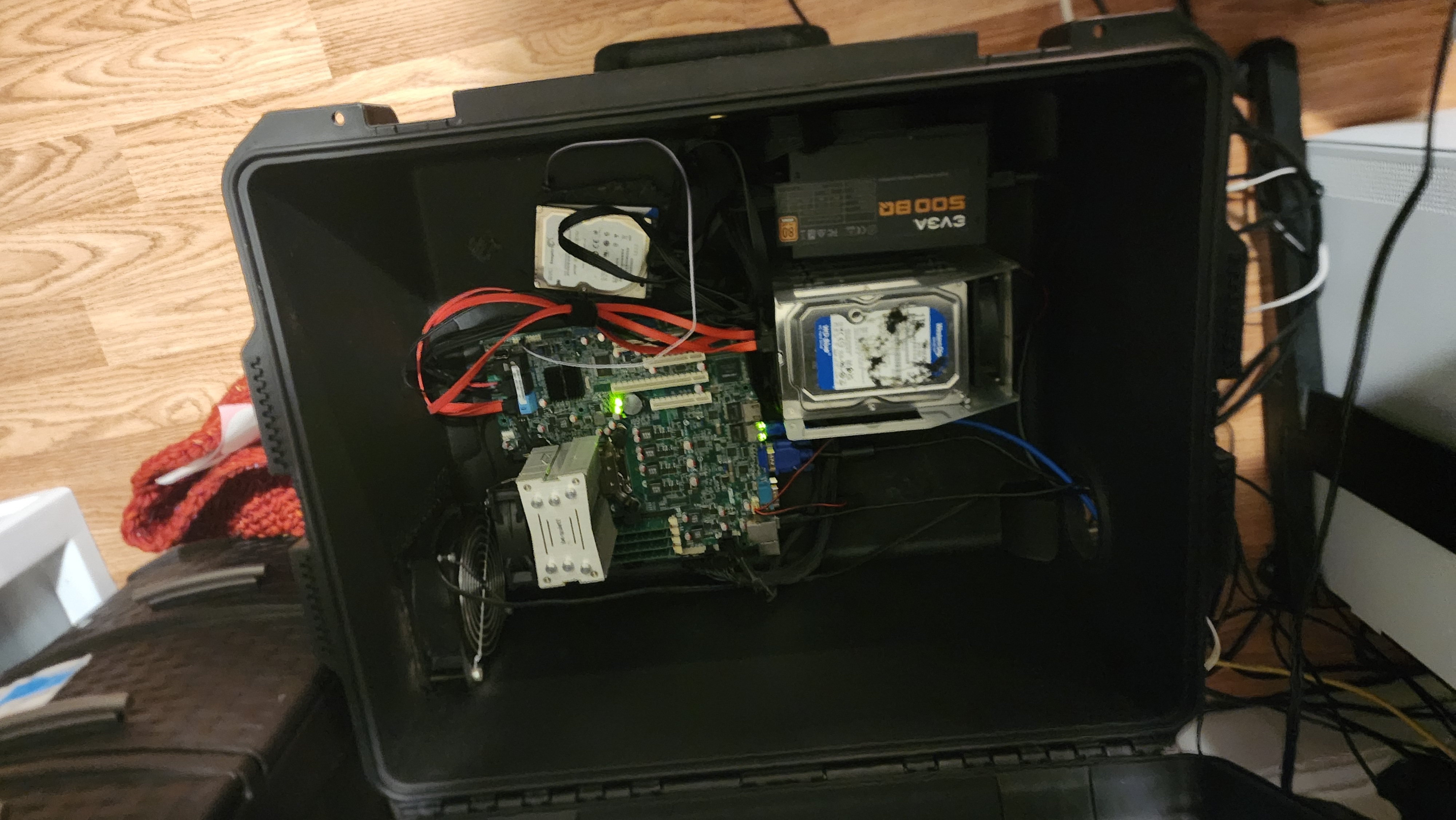
mostly runs jellyfin for a group of about 30 users (2 or 3 on at most times). runs alpine on bare bones. the box was originally filled with foam cutouts from storing iPads in a school district I worked at. I figure it’s 20tbs of storage and 16gb ecc is a welcome upgrade. it stays cool cause I cutout half the side and put an AC fan in there. future upgrades involve the Nvidia k40 card I have, but I need to design an active cooling system for it before it can be installed as that thing gets HOT
I’m impressed that you can handle that many jellyfin users







